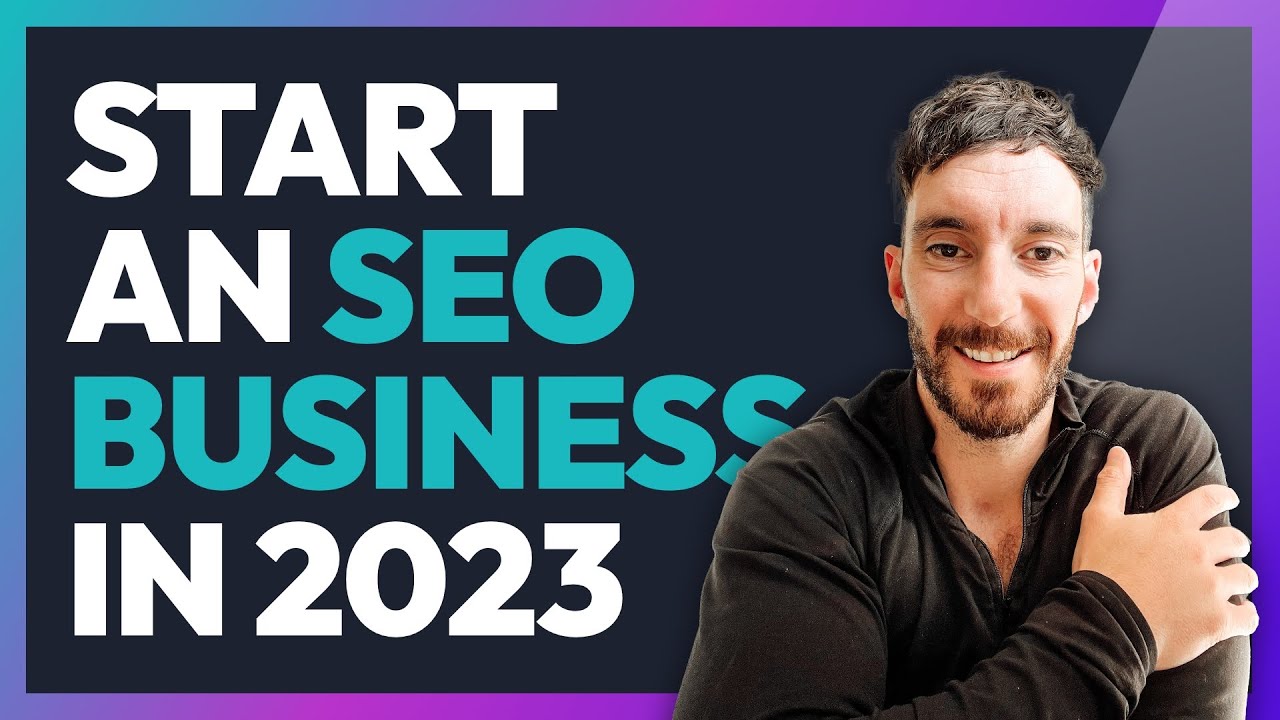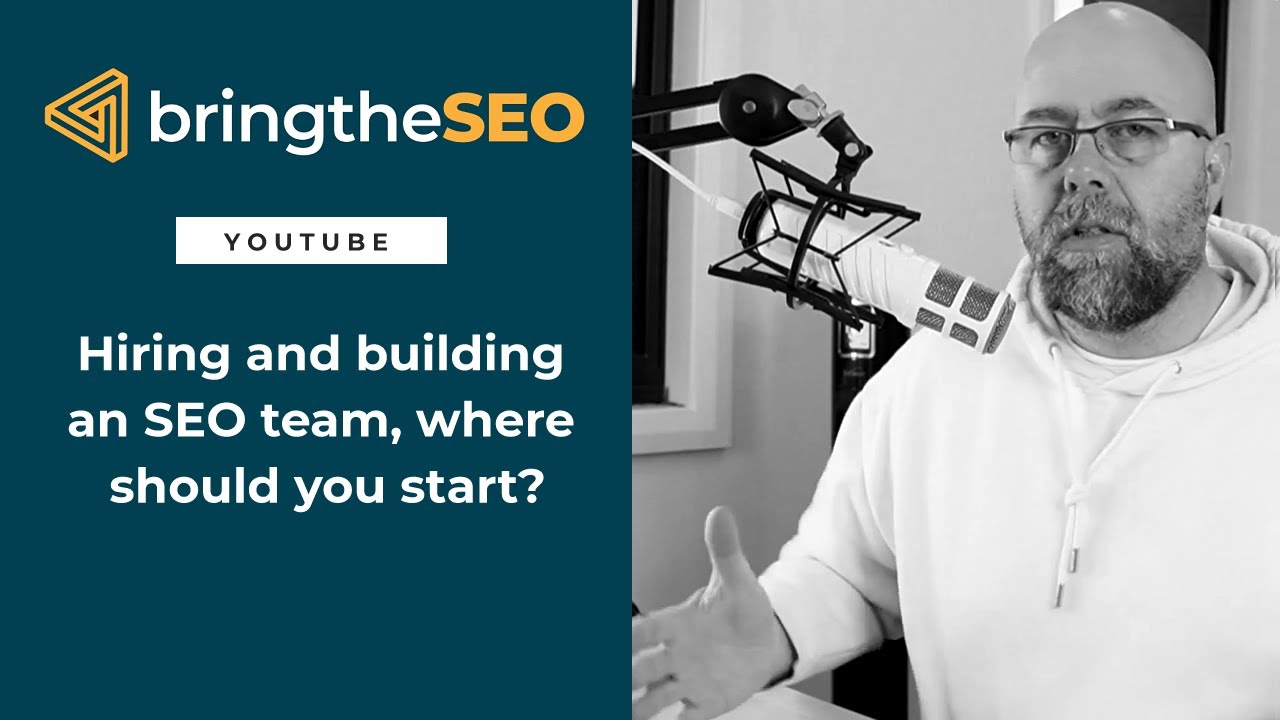In the ever-expanding digital landscape, search engine optimization(SEO) has emerged as a fundamental pillar for online success. As businesses strive to enhance their visibility and attract organic traffic, the demand for SEOservices has surged, presenting a remarkable opportunity for aspiring entrepreneurs to build their own SEOagencies. In this article, we will explore how to build an SEO agency, from understanding the SEO landscape to cultivating client relationships and staying ahead in a constantly evolving industry. However, embarking on this journey requires careful planning, industry knowledge, and effective strategies.
Why Start An SEO Business?

SEO for beginners 2023 (How to easily start an SEO company)
Starting an SEO businesscan be an exciting and rewarding venture for several compelling reasons:
- High Demand -In today's digital age, businesses across various industries rely heavily on search engines to attract customers. The demand for SEO services is constantly growing as businesses recognize the importance of organic search visibility and the impact it has on their online success.
- Lucrative Opportunity -SEO services are highly valued, and businesses are willing to invest significant resources to improve their search enginerankings. As an SEO businessowner, you have the potential to generate substantial revenue and profitability by offering specialized expertise and delivering tangible results for clients.
- Flexible Work Environment -Running an SEO business allows for flexibility in terms of work environment and schedule. You can choose to work from a physical office, work remotely, or even operate as a solopreneur. This flexibility enables you to design a work-life balance that suits your preferences and lifestyle.
- Continuous Learning and Growth -The field of SEO is ever-evolving, with search engines constantly updating their algorithms and introducing new ranking factors. As an SEO business owner, you'll have the opportunity to continuously learn and adapt to these changes, expanding your knowledge and skillset while staying at the forefront of industry trends.
- Creative and Analytical Challenges -SEO combines elements of both creativity and analytics. You'll be challenged to develop innovative strategies, create engaging content, and solve technical issues while analyzing data, measuring performance, and optimizing results. This blend of creativity and analytical thinking keeps the work dynamic and intellectually stimulating.
- Helping Businesses Succeed -By starting an SEO business, you have the opportunity to make a significant impact on the success of other businesses. By improving their organic visibility, driving targeted traffic, and increasing conversions, you can help businesses grow, expand their reach, and achieve their online goals.
- Entrepreneurial Freedom -Starting an SEO business provides you with the opportunity to be your own boss, set your own goals, and create a company culture that aligns with your values. You have the freedom to shape the direction of your business and make decisions that will drive its growth and success.
What Does An SEO Agency Do?

What Does an SEO Company Do? Get the Details!
An SEO agency specializes in providing services that optimize websites for search engines. Their primary goal is to improve a website's visibility and organic rankings in search engine results pages (SERPs). To achieve this, an SEO agency employs a range of strategies and tactics, including:
- Keyword Research -Identifying relevant keywords and phrases that have high search volume and align with the client's business objectives.
- On-Page Optimization -Optimizing various on-page elements, such as meta tags, headers, URL structures, and content, to make them more search engine-friendly and relevant to target keywords.
- Content Creationand Optimization -Developing high-quality, engaging content that incorporates targeted keywords strategically. This may involve creating blog posts, articles, infographics, videos, and other forms of content.
- Link Building-Acquiring high-quality backlinksfrom reputable and relevant websites to improve a website's authority and credibility in the eyes of search engines.
- Technical SEO- Conducting technical audits to identify and resolve issues that may hinder a website's performance in search results. This includes optimizing site speed, improving mobile-friendliness, fixing broken links, and enhancing site structure.
- Local SEO -Implementing strategies to improve a website's visibility in local search results, especially for businesses targeting a specific geographic area.
- Analytics and Reporting -Monitoring website performance, tracking key metrics (e.g., organic traffic, keyword rankings), and providing regular reports to clients on the progress and impact of SEO efforts.
- Staying Updated -Keeping abreast of the latest trends, algorithm updates, and best practices in the ever-evolving field of SEO to ensure effective and up-to-date strategies.
Are SEO Agencies Profitable?

SEO Agency 2024: How I Made $1,600,000 With An SEO Agency
Yes, SEO agencies can be highly profitable. The profitability of an SEO agency depends on several factors, including the agency's expertise, the quality of services provided, the competitiveness of the market, and the ability to attract and retain clients. Here are some reasons why SEO agencies can be profitable:
- High-Demand Industry -The demand for SEO services continues to grow as businesses recognize the importance of organic search visibility. With businesses increasingly investing in digital marketing, SEO has become a critical component of their online strategies.
- Recurring RevenueModel -Many SEO agencies offer ongoing services such as monthly retainers, allowing for a recurring revenue stream. This provides stability and predictable income for the agency, especially when working with long-term clients.
- Value-Based Pricing -SEO agencies often price their services based on the value they deliver to clients. By improving a website's organic rankings, driving targeted traffic, and increasing conversions, SEO agencies can demonstrate a tangible return on investment (ROI) for their clients, which justifies higher pricing.
- Scalability -With the right systems, processes, and teams in place, SEO agencies can scale their operations effectively. As the agency acquires more clients, it can expand its team and handle multiple projects simultaneously, increasing revenue without proportional increases in costs.
- Upselling and Cross-Selling Opportunities -SEO agencies can leverage their client relationships to offer additional services or upsell existing clients. This may include offering content marketing, social media management, paid advertising, or website developmentservices, expanding the range of revenue streams.
- Low Overhead Costs -SEO agencies can be operated with relatively low overhead costs compared to other businesses. With minimal physical infrastructure requirements, a significant portion of revenue can be allocated to profits and investments in business growth.
- Industry Expertise -As an SEO agency builds its reputation and establishes itself as an industry expert, it can attract high-value clients willing to pay a premium for specialized knowledge and experience. Premium pricing and a strong brand image contribute to increased profitability.
Defining Your SEO Agency Niche

Should You Select a Niche for Your SEO Agency?
Defining a niche for your SEO agency is crucial for positioning yourself in the market and attracting the right clients. By specializing in a specific industry or offering unique services, you can differentiate your agency and establish yourself as an expert in that particular area. Here are some steps to help you define your SEO agency niche:
- Evaluate Your Expertise and Interests -Start by assessing your own skills, expertise, and interests. Consider the industries or types of businesses you have experience working with or have a strong passion for. Identify the areas where you can provide the most value and leverage your expertise effectively.
- Research Market Demand -Conduct thorough market research to identify industries or niches with high demand for SEO services. Look for industries that are growing, have a strong online presence, or are underserved in terms of SEO expertise. Analyze keyword trends, search volumes, and competition to understand the potential market opportunity.
- Identify Target Audience -Determine the specific target audience within your chosen niche. Consider factors such as business size, location, target demographics, and unique needs or pain points. Understanding your target audience will help you tailor your services and marketing messages effectively.
- Analyze Competitors -Study the competitive landscape within your chosen niche. Identify other SEO agencies or service providers operating in that space. Assess their strengths, weaknesses, and gaps in their service offerings. Look for opportunities to differentiate your agency and provide a unique value proposition.
- Consider Specialized Services -Explore the possibility of offering specialized SEO services within your niche. This could include specific areas such as local SEO, e-commerce SEO, technical SEO, or content-focused SEO. Specializing in a specific aspect of SEO can help you become a go-to expert in that area.
- Evaluate Profitability -Assess the profitability potential of your chosen niche. Consider factors such as the average budget businesses in that niche allocate to SEO, the potential for recurring revenue, and the overall market size. Ensure that the niche you select has enough demand and revenue potential to support your agency's growth.
- Refine Your Brandingand Messaging -Once you have defined your niche, align your brandingand messaging accordingly. Develop a strong value proposition that highlights your expertise in serving that particular niche. Tailor your marketing materials, website content, and communication to resonate with your target audience and position yourself as the go-to agency for their specific needs.
Developing Your Service Offerings
When building an SEO agency, developing a comprehensive and compelling range of service offerings is essential to meet the needs of your clients and differentiate your agency from competitors. Here are some steps to guide you in developing your service offerings:
- Assess Client Needs -Begin by understanding the specific needs and pain points of your target audience. Conduct market research, analyze industry trends, and engage with potential clients to identify the SEO services that are in high demand within your chosen niche. Consider the challenges they face and the goals they aim to achieve through SEO.
- Core SEO Services -Start with foundational SEO services that are essential for improving organic visibility and search engine rankings. This may include keyword research and analysis, on-page optimization, content creation and optimization, link building, technical SEO audits, and analytics and reporting.
- Specialized Services -Consider offering specialized services that cater to the unique needs of your niche or address specific challenges in the market. For example, if you specialize in e-commerce SEO, you can provide services like product page optimization, conversion rate optimization, and e-commerce platform integration. Tailoring your services to your niche can set you apart and attract clients seeking expertise in their specific industry.
- Local SEO -With the growing importance of local search, consider offering local SEO services if it aligns with your target audience. This includes optimizing business listings, managing online reviews, implementing local citation strategies, and enhancing local search visibility for brick-and-mortar businesses.
- Content Marketing -Content plays a crucial role in SEO success. Consider offering content marketing services that include content strategydevelopment, blog writing, guest posting, content promotion, and social media contentoptimization. This can help clients establish their online presence, engage their target audience, and attract organic traffic.
- SEO Audits and Consultation -Offer comprehensive SEO audits to identify areas of improvement on clients' websites. Provide detailed reports, recommendations, and actionable insights to help them optimize their SEO strategies. Additionally, offer SEO consultation services where clients can seek advice and guidance on their SEO efforts.
- Reporting and Analysis -Provide regular reports and analyses to demonstrate the value of your services. Present key metrics such as organic traffic growth, keyword rankings, conversion rates, and return on investment. Customize your reports to align with the client's goals and provide actionable insights for further optimization.
- Customized Packages -Develop customized service packages that align with different client budgets and requirements. Offer various tiers of services, allowing clients to choose the level of support that suits their needs. This flexibility helps accommodate a wide range of clients and enhances customer satisfaction.
- Stay Updated with Industry Trends -Continuously monitor and adapt your service offerings to align with emerging trends and evolving search engine algorithms. Stay informed about the latest advancements in SEO, such as voice search optimization, mobile SEO, and AI-driven SEO strategies. This positions your agency as a trusted resource and ensures your clients receive cutting-edge solutions.
Building A Team Of Experts

Hiring and building an SEO team, where should you start?
Building a team of experts is vital for the success and growth of your SEO agency. Having a skilled and dedicated team will not only enhance the quality of your services but also enable you to handle larger projects and provide comprehensive solutions to your clients. Here are some steps to help you build a strong team of experts:
- Define Roles and Skills -Start by identifying the specific roles and skills you need in your team. This may include SEO specialists, content writers, web developers, link builders, data analysts, project managers, and sales and marketing professionals. Clearly define the responsibilities and qualifications for each role.
- Recruitment and Hiring -Develop a strategic recruitment plan to attract top talent. Utilize various channels, such as job boards, industry-specific websites, social media, and professional networks, to advertise your job openings. Conduct thorough interviews and assessments to evaluate candidates' skills, experience, and cultural fit with your agency.
- Industry Experience and Expertise -Look for candidates with a proven track record of success in the SEO industry. Seek individuals who possess in-depth knowledge of SEO strategies, best practices, and the latest industry trends. Consider their experience working with clients in your target niche, as domain expertise can be highly valuable.
- Collaboration and Teamwork -Building a cohesive and collaborative team is crucial. Look for individuals who can work effectively in a team environment, communicate clearly, and contribute to a positive and supportive workplace culture. Assess candidates' ability to collaborate, problem-solve, and adapt to changing project requirements.
- Continual Learning and Growth -SEO is an ever-evolving field, so it's essential to have team members who are committed to continuous learning and growth. Look for candidates who demonstrate a passion for staying up to date with industry changes, attending conferences, pursuing certifications, and actively participating in professional development activities.
- Training and Development -Invest in training and development programs to enhance the skills and knowledge of your team members. Provide opportunities for them to learn new SEO techniques, master new tools and technologies, and stay ahead in the competitive landscape. Encourage certifications and offer support for attending industry conferences and workshops.
- Effective Communication and Collaboration Tools -Utilize effective project management and communication tools to streamline collaboration within your team. This ensures efficient coordination, smooth workflow, and seamless communication. Platforms such as project management software, communication apps, and file-sharing systems can enhance productivity and foster collaboration.
- Retaining Top Talent -Create a positive and rewarding work environment to retain your top talent. Offer competitive compensation packages, performance-based incentives, opportunities for careeradvancement, and a supportive work-life balance. Regularly recognize and appreciate your team members' contributions to foster a sense of belonging and job satisfaction.
Establishing Strong Processes And Workflows
Establishing strong processes and workflows is crucial for the smooth and efficient operation of your SEO agency. Well-defined processes ensure consistency, improve productivity, and enable effective collaboration within your team. Here are some steps to help you establish strong processes and workflows:
- Map Out Your Processes -Start by mapping out the key processes involved in delivering your SEO services. This includes client onboarding, keyword research, content creation, on-page optimization, link building, reporting, and any other tasks specific to your agency. Identify the sequence of steps, dependencies, and key milestones for each process.
- Standardize Procedures and Templates -Create standardized procedures and templates for each process to maintain consistency and streamline operations. Document step-by-step instructions, guidelines, and best practices for your team to follow. Develop templates for deliverables, reports, and communication materials to save time and ensure professionalism.
- Utilize Project Management Tools -Implement project management tools to facilitate task management, collaboration, and project tracking. Choose a tool that suits your agency's needs and enables effective communication, file sharing, and deadline management. Utilize features like task assignments, status updates, and progress tracking to keep everyone aligned and accountable.
- Assign Clear Roles and Responsibilities -Clearly define roles and responsibilities for each team member involved in the processes. Assign ownership for specific tasks and ensure that everyone understands their roles and knows who to reach out to for assistance or clarification. This clarity promotes accountability and smooth workflow.
- Establish Communication Channels -Establish effective communication channels within your team to foster collaboration and knowledge sharing. Utilize messaging apps, project management tools, and email to facilitate communication. Set expectations for response times, regular check-ins, and team meetings to ensure efficient coordination.
- Implement Quality Control Measures -Develop quality control measures to ensure the accuracy and effectiveness of your deliverables. Implement peer reviews, proofreading, and QA checks to catch any errors or inconsistencies. Continuously monitor the quality of your work and iterate on your processes to improve outcomes.
- Document and Update Processes - Document your processes and workflows in a centralized knowledge base. This helps onboard new team members quickly and serves as a reference for your existing team. Regularly review and update your processes as needed to adapt to changes in the industry or to optimize efficiency.
- Measure and Improve Performance -Implement performance metrics and tracking mechanisms to measure the effectiveness of your processes. Analyze key performance indicators (KPIs) such as project timelines, task completion rates, client satisfaction, and team productivity. Use the insights gained to identify areas for improvement and optimize your processes further.
Creating An Effective Marketing Strategy
Creating an effective marketing strategy is crucial for promoting your SEO agency and attracting clients. A well-planned and targeted marketing strategy helps build brand awareness, showcase your expertise, and differentiate your agency from competitors. Here are some steps to create an effective marketing strategy for your SEO agency:
- Define Your Target Audience -Start by clearly identifying your target audience. Understand their characteristics, needs, pain points, and motivations. Determine the industries, business sizes, and geographical locations you want to focus on. This helps tailor your marketing messages and channels to reach the right audience effectively.
- Craft a Compelling Value Proposition -Develop a strong and unique value proposition that highlights the benefits of choosing your agency. Clearly communicate the specific value and results your agency offers to clients. Focus on what sets you apart from competitors and how your services address the needs of your target audience.
- Build a Professional Website -Create a professional and user-friendly website that serves as a central hub for your agency's online presence. Optimize it for search engines to improve its visibility. Ensure that your website clearly showcases your services, expertise, case studies, testimonials, and contact information. Incorporate clear calls-to-action (CTAs) to encourage visitors to engage with your agency.
- Content Marketing - Develop a content marketing strategy to establish your agency as a thought leader and attract organic traffic. Create valuable and educational content such as blog posts, articles, guides, videos, and infographics. Focus on topics that resonate with your target audience, address their pain points, and provide insights into SEO best practices.
- Social Media Engagement -Leverage social media platforms to build your agency's brand presence and engage with your target audience. Identify the platforms that are most relevant to your audience and actively participate in industry discussions. Share your content, industry news, client successes, and thought leadershipto build credibility and attract followers.
- Guest Blogging and Influencer Collaborations -Identify industry influencers, bloggers, and publications that align with your target audience. Seek opportunities for guest blogging, contributing articles, or collaborating on joint content projects. This expands your reach, establishes credibility, and attracts traffic from relevant sources.
- Online Advertising -Consider online advertising to increase your agency's visibility and reach. Utilize platforms such as Google Ads, social media advertising, or display advertising to target your audience with tailored messaging. Optimize your campaigns to drive traffic, generate leads, or promote specific service offerings.
- Client Testimonials and Case Studies -Showcase the success stories and results you have achieved for clients. Feature testimonials and case studies on your website and marketing materials to demonstrate your agency's capabilities and the value you deliver. Social proof plays a crucial role in building trust and attracting new clients.
- Networking and Partnerships -Attend industry conferences, webinars, and networking eventsto connect with potential clients and industry professionals. Build relationships with complementary service providers, such as web designers, marketing agencies, or PR firms, to explore partnership opportunities and referral networks.
- Monitor and Measure Results -Continuously monitor and measure the results of your marketing efforts. Utilize analytics tools to track website traffic, lead generation, conversion rates, and other relevant metrics. Analyze the data to optimize your strategies, identify areas of improvement, and allocate resources effectively.
Cultivating Client Relationships

How Successful People Manage Client Relationships - Millionaire Productivity Habits Ep. 17
Cultivating strong client relationships is essential for the success and growth of your SEO agency. Building trust, providing exceptional customer service, and demonstrating the value of your services are key factors in fostering long-term partnerships. Here are some steps to help you cultivate client relationships:
- Understand Client Goals -Begin by gaining a deep understanding of your client's goals and objectives. Listen actively to their needs, challenges, and desired outcomes. This helps you tailor your services and strategies to align with their specific goals, creating a personalized approach that resonates with them.
- Communication and Transparency -Maintain open lines of communication with your clients. Establish regular check-ins, progress updates, and reporting schedules. Keep clients informed about the status of their SEO projects, key milestones, and any challenges or opportunities that arise. Be transparent about your strategies, methodologies, and the results you are achieving.
- Proactive Client Education - Educate your clients about SEO best practices, industry trends, and the value of the services you provide. Help them understand the impact of SEO on their business and how it aligns with their overall marketing objectives. Proactively share insights, recommendations, and actionable tips to empower your clients and build their confidence in your expertise.
- Deliver Tangible Results -Demonstrate the value of your services by delivering tangible results. Track and report key metrics such as organic traffic growth, keyword rankings, conversion rates, and ROI. Show clients the positive impact your SEO efforts have on their business, whether it's increased website visibility, higher search rankings, or improved lead generation.
- Exceptional Customer Service -Provide exceptional customer service at every touchpoint. Respond promptly to client inquiries, concerns, or feedback. Anticipate their needs and go above and beyond to exceed their expectations. Show that you genuinely care about their success and are dedicated to helping them achieve their business goals.
- Regular Performance Reviews -Conduct regular performance reviews with your clients to assess their satisfaction and address any concerns or areas for improvement. Seek feedback on your agency's performance, responsiveness, and the value they perceive from your services. Use these reviews as an opportunity to align expectations, set new goals, and reinforce the partnership.
- Customized Strategies and Recommendations -Tailor your strategies and recommendations to the unique needs of each client. Recognize that different businesses may require specific approaches based on their industry, target audience, and goals. Provide customized solutions and advice that address their specific challenges and help them stand out in their market.
- Value-added Services and Insights -Offer value-added services that go beyond basic SEO offerings. Provide additional insights, market research, or competitor analysis to help clients make informed decisions. Share industry updates, emerging trends, and opportunities to help them stay ahead in the ever-evolving digital landscape.
- Relationship-Building Activities -Foster personal connections with your clients by organizing relationship-building activities. This can include face-to-face meetings, virtual events, or even sending personalized thank-you notes or small tokens of appreciation. Building a personal connection helps establish trust and loyalty.
- Continual Support and Adaptation -Stay engaged with your clients even after the initial project or contract is completed. Offer ongoing support, advice, and assistance to help them navigate any new challenges or opportunities that arise. Adapt your strategies and services based on changes in the industry or shifts in their business goals.
Continuous Learning And Adaptation
The SEO landscape is constantly evolving, and staying updated is essential for maintaining your agency's competitiveness. Encourage continuous learning among your team members and invest in their professional development. Attend industry conferences, webinars, and workshops to stay abreast of the latest SEO trends and changes in search engine algorithms.
People Also Ask
How Long Does It Take To See Results From An SEO Agency?
The timeframe to see results from an SEO agency can vary depending on several factors, including the competitiveness of the keywords, the current state of the website, and the quality and consistency of SEO efforts. Generally, it can take several months to start seeing noticeable improvements in organic rankings and website traffic.
What Should I Look For When Hiring An SEO Agency?
When hiring an SEO agency, it's important to consider factors such as their experience and track record, client testimonials and case studies, their approach to SEO strategies, communication and reporting practices, and their ability to understand and align with your business goals.
Can I Do SEO Myself Or Should I Hire An Agency?
It is possible to learn and implement SEO strategies yourself, especially for smaller websites or businesses with limited budgets. However, hiring an SEO agency offers several advantages, including expertise, access to specialized tools and resources, time savings, and the ability to stay up to date with industry changes.
Conclusion
Building an SEO agency requires a strategic and multifaceted approach. The process involves careful planning, continuous learning, and adaptation to the ever-evolving landscape of search engine optimization. By following the steps outlined in this guide and leveraging the power of effective communication, client relationships, and technical expertise, aspiring entrepreneurs can establish a successful SEO agency.